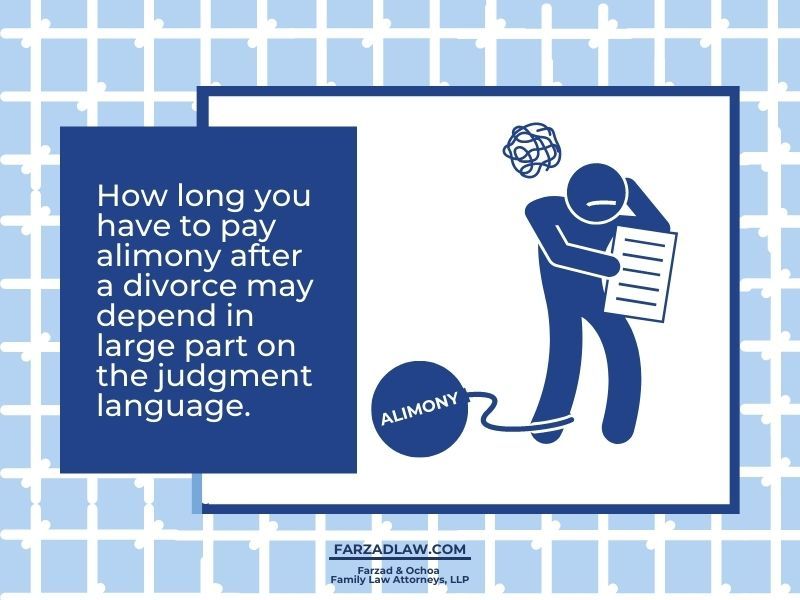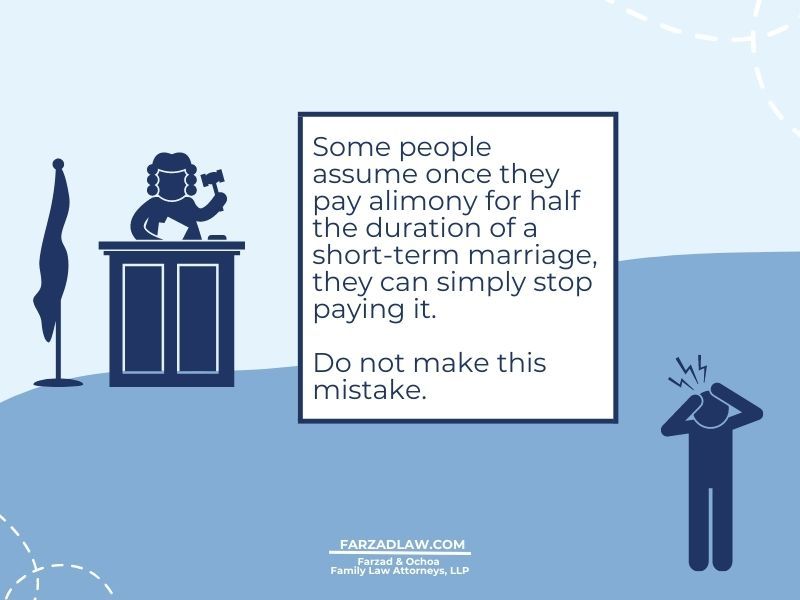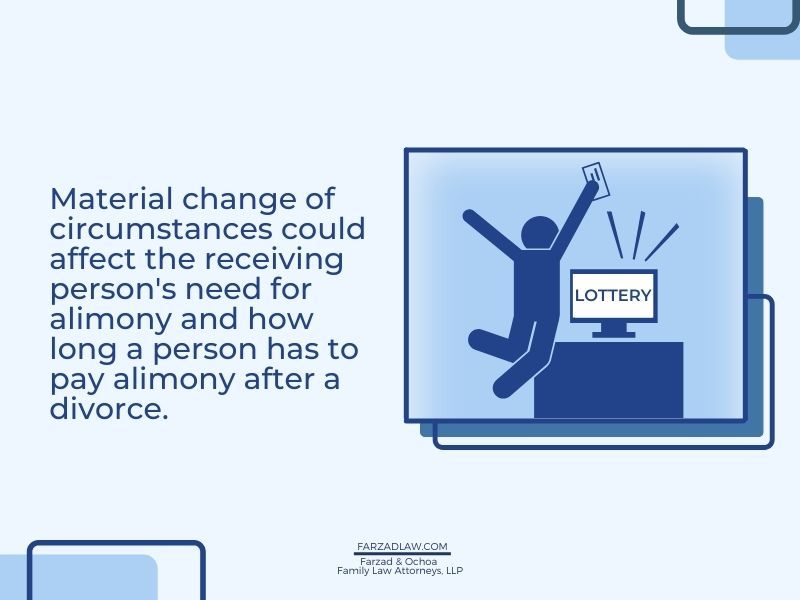How long do you have to pay alimony in a short or long marriage?
In a short marriage (under 10 years) the answer is usually, at the most, one-half the duration of the marriage. In a long marriage (10 or more years), the answer may be until either spouse's death, the receiving spouse's remarriage or further order of the court.
However, these are just general scenarios. The answer may be completely different in short or long marriages, depending on the case's individual facts. How long alimony lasts is not always a simple answer. Let's look at this issue in more detail. Nothing on this page is intended as legal advice.
If your divorce judgment covers alimony duration, that is the first place you look

For example, the typical alimony order states one person pays the other person alimony at a set amount each month until:
- Death of either party,
- Remarriage of the person who receives alimony, or
- Further order of the court.
In short term marriages, as we discuss below, there is usually an end date for alimony. In long-term marriages, it can be left open ended or there can also be an end date.
There are numerous different ways a judgment may recite alimony terms. Therefore, those terms can significantly impact how long a person has to pay alimony after a divorce.
So what is the lesson here? An experienced family law attorney should carefully review your divorce judgment. That attorney can then tell you what impact it may have on how long you have to pay alimony.
Difference between short versus long marriages
You may wonder what we mean by a short-term marriage.
Typically, California law calls a short-term marriage a marriage of under 10 years. If a marriage is for example only five years in length, it is a short-term marriage.
But what about a marriage that is nine years 11 months?
Is that a short-term marriage even though it got very close to the 10 year mark?
Short answer is, "it depends." The court has the power to treat a short-term marriage as a long-term marriage. It also has the power to sometimes treat a long-term marriage like a short one.
There is no black-and-white rule on the 10 year topic
Our experience is unless there are unusual circumstances involved, if the marriage is nine years or less, it will be treated as a short-term marriage.
A marriage that is between 9 to 10 years can sometimes be in that gray area.
A long-term marriage is a marriage that is 10 years or longer
Typically, per California Family Code 4336, the court continues to reserve its jurisdiction to order alimony in a long-term marriage without a termination date unless the parties agree otherwise or the court orders otherwise.
But, as you will read below, just because spouses hit a 10 year marriage does not mean the court will not terminate alimony.
How long do you have to pay alimony in a short-term marriage?
We will assume there are no unusual terms in the divorce judgment regarding the alimony. We will also assume the divorce judgment does not have its own termination date for alimony.
In such a scenario, a person who had a short term marriage usually pays alimony after the divorce judgment until approximately half the duration of the marriage.
And if the judgment does not contain an express termination date, that person must go to court and ask the court to terminate alimony.
Do not assume alimony terminates on its own

The mistake some people make is to assume just because they have paid alimony for half the duration of a short-term marriage, they can simply stop paying it.
But unless the actual divorce judgment terminates alimony at the half-way mark, the alimony may continue after that time. That is why an attorney must review your judgment to give you advice.
So how long you have to pay alimony after a divorce judgment in a short-term marriage is not something you can assume.
Just because you hit the one half way duration of the marriage mark does not mean alimony automatically ends. Instead, you should seek a family law attorney's advice to tell you when the appropriate time is to proceed to court and end alimony.
How long do you have to pay alimony in a long-term marriage?
Let's assume the judgment does not have its own termination date, the judgment simply states alimony is paid until the death of either party, the remarriage of the person who receives alimony or further order of the court.
The length of time will depend on whether there is a material change of circumstances that justifies the paying person to go to court and seek a modification.
We discuss this further below...
While death and remarriage automatically cut off alimony, unless the parties agreed otherwise in their divorce judgment, alimony in a long-term marriage can go on for more than the one-half the duration of the marriage.
For example, in a 12 year marriage, alimony can certainly exceed the six year mark. But alimony can also be terminated under the six year mark if there are proper material change of circumstances.
How long do you have to pay alimony in a very long-term marriage?
California law does not define a "very" long-term marriage. For practical purposes, we consider marriages of 20 or more years to be very long-term.
And practically speaking, it is probably easier to terminate alimony in a marriage that is 10 years and one month that it is in a marriage that is 30 years and one month. How much easier of course depends on the facts of each case.

